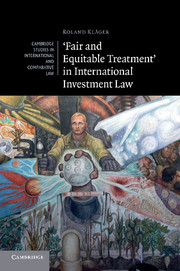Book contents
- Frontmatter
- Contents
- Foreword
- Acknowledgements
- Table of cases
- Table of treaties
- List of abbreviations
- 1 Introduction
- Part I The construction of fair and equitable treatment
- Part II The concept of fair and equitable treatment
- 5 Conceptual challenges
- 6 Fair and equitable treatment and justice
- 7 Principles of fair and equitable treatment
- Part III The position of fair and equitable treatment in the international legal system
- 10 Conclusion
- Bibliography
- Index
- misc-endmatter
5 - Conceptual challenges
Published online by Cambridge University Press: 05 July 2011
- Frontmatter
- Contents
- Foreword
- Acknowledgements
- Table of cases
- Table of treaties
- List of abbreviations
- 1 Introduction
- Part I The construction of fair and equitable treatment
- Part II The concept of fair and equitable treatment
- 5 Conceptual challenges
- 6 Fair and equitable treatment and justice
- 7 Principles of fair and equitable treatment
- Part III The position of fair and equitable treatment in the international legal system
- 10 Conclusion
- Bibliography
- Index
- misc-endmatter
Summary
A Conceptual problems in arbitral jurisprudence
This part is devoted to an analysis of the substance of fair and equitable treatment and its underlying conceptual basis. While the previous discussion mainly focused on the question regarding wherefrom justificatory arguments may be derived, the following will delve into the subject matter of these arguments and the specific constructions of fair and equitable treatment built by arbitral tribunals thereupon. In particular, an attempt is made to identify and discuss certain sources of arguments which different strands of arbitral jurisprudence are beginning to display, and to explore the deeper conceptual foundation of these schemes. Arguably, this foundation has to reflect the aforementioned findings that fair and equitable treatment is not equipped with some intrinsic meaning, but is rather of an integrative and dynamic nature enabling the establishment of inter-systemic linkages within the international legal system. Moreover, this part reviews if and in which way such a conceptualisation is able to improve the quality of legal reasoning in relation to fair and equitable treatment.
In the general debate on fair and equitable treatment, it appears that considerations as to the concept of this norm are mainly absent. Rather, it seems that doctrinal discussions reaching beyond the dichotomy between the equating and plain meaning approaches are often avoided by highlighting the fact-specific nature of fair and equitable treatment.
- Type
- Chapter
- Information
- 'Fair and Equitable Treatment' in International Investment Law , pp. 115 - 128Publisher: Cambridge University PressPrint publication year: 2011



